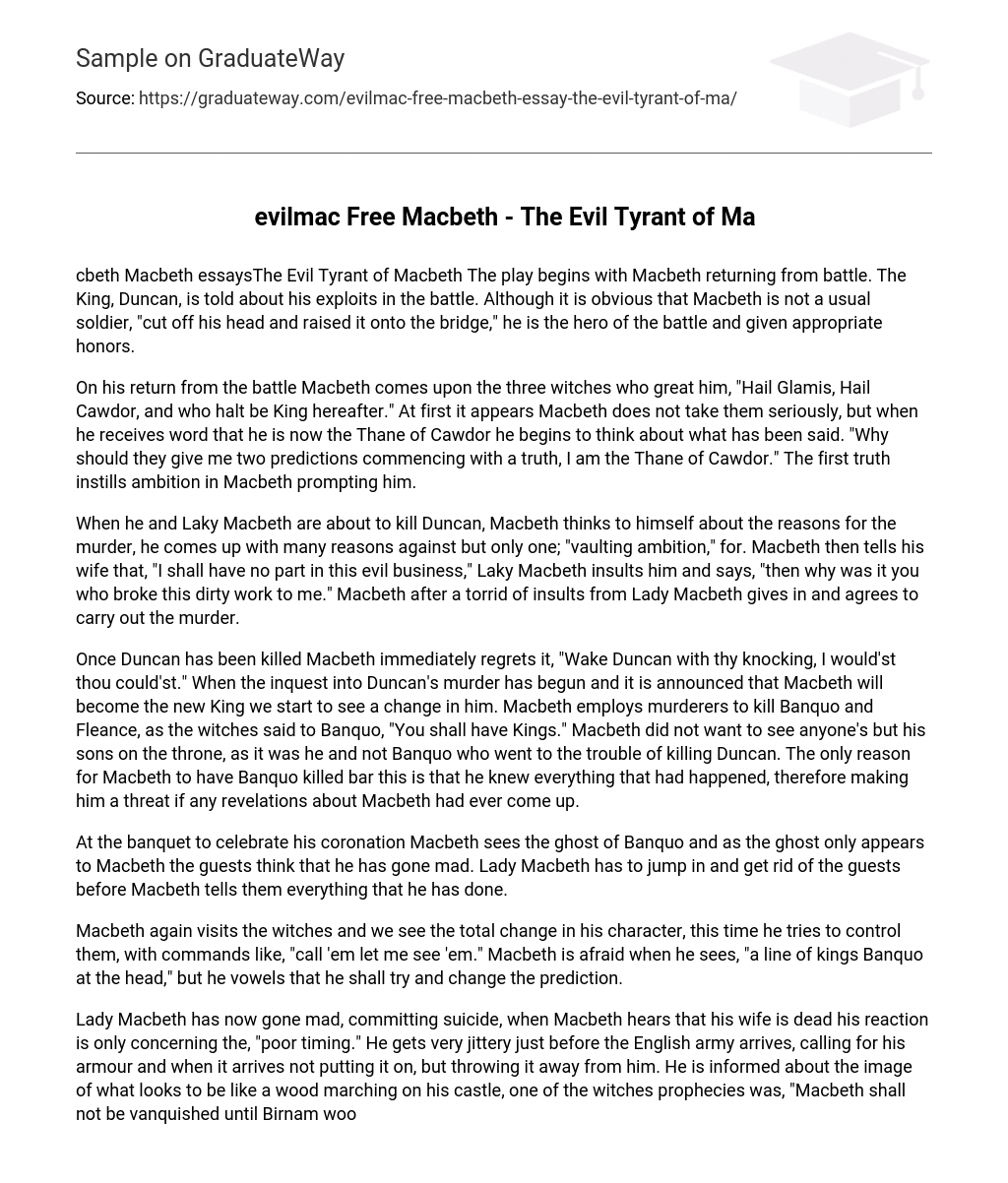The Evil Tyrant of Macbeth
The play begins with Macbeth returning from battle. The King, Duncan, is told about his exploits in the battle. Although it is obvious that Macbeth is not a usual soldier, “cut off his head and raised it onto the bridge,” he is the hero of the battle and given appropriate honors.
On his return from the battle Macbeth comes upon the three witches who great him, “Hail Glamis, Hail Cawdor, and who halt be King hereafter.” At first it appears Macbeth does not take them seriously, but when he receives word that he is now the Thane of Cawdor he begins to think about what has been said. “Why should they give me two predictions commencing with a truth, I am the Thane of Cawdor.” The first truth instills ambition in Macbeth prompting him.
When he and Laky Macbeth are about to kill Duncan, Macbeth thinks to himself about the reasons for the murder, he comes up with many reasons against but only one; “vaulting ambition,” for. Macbeth then tells his wife that, “I shall have no part in this evil business,” Laky Macbeth insults him and says, “then why was it you who broke this dirty work to me.” Macbeth after a torrid of insults from Lady Macbeth gives in and agrees to carry out the murder.
Once Duncan has been killed Macbeth immediately regrets it, “Wake Duncan with thy knocking, I would’st thou could’st.” When the inquest into Duncan’s murder has begun and it is announced that Macbeth will become the new King we start to see a change in him. Macbeth employs murderers to kill Banquo and Fleance, as the witches said to Banquo, “You shall have Kings.” Macbeth did not want to see anyone’s but his sons on the throne, as it was he and not Banquo who went to the trouble of killing Duncan. The only reason for Macbeth to have Banquo killed bar this is that he knew everything that had happened, therefore making him a threat if any revelations about Macbeth had ever come up.
At the banquet to celebrate his coronation Macbeth sees the ghost of Banquo and as the ghost only appears to Macbeth the guests think that he has gone mad. Lady Macbeth has to jump in and get rid of the guests before Macbeth tells them everything that he has done.
Macbeth again visits the witches and we see the total change in his character, this time he tries to control them, with commands like, “call ’em let me see ’em.” Macbeth is afraid when he sees, “a line of kings Banquo at the head,” but he vowels that he shall try and change the prediction.
Lady Macbeth has now gone mad, committing suicide, when Macbeth hears that his wife is dead his reaction is only concerning the, “poor timing.” He gets very jittery just before the English army arrives, calling for his armour and when it arrives not putting it on, but throwing it away from him. He is informed about the image of what looks to be like a wood marching on his castle, one of the witches prophecies was, “Macbeth shall not be vanquished until Birnam wood come to Dunsinane.” Macbeth knows that although his position is futile he has to fight on, as he will only be killed if he does not, and there was always the chance that he could defeat the English.
In the ensuing fight he fights off and kills his first attacker; young Siward, but Macduff kills him putting his head on a pole and mounting it on the battlements. I conclude that until just before he is crowned, Macbeth is a tragic hero; after he is crowned he becomes an evil tyrant. I believe that had it not been for the other characters especially the witches Macbeth would not have committed the crimes that he did, and therefore not have become an evil tyrant. He was lead into things by the other characters around him, without his wife I believe that he would not have committed the murder of Duncan. In short it was the influence exerted by the other characters that changed Macbeth into the evil tyrant that we see at the end of the play.





